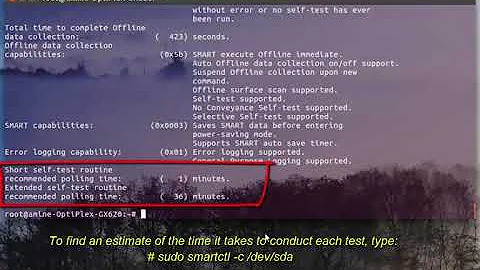Monitor disk health using smartd (in smartmontools) on a high availability software RAID 1 server
Solution 1
I switched from long selftests to select,cont tests. It's like the long selftest, but only one slice of disk at a time. So while the long selftest may take well over a day (with an otherwise busy 3TB disk), the selective test can run every night when the server is the least busy and actually finish, without harming performance in the more busy hours.
So basically you would be distributing a monthly long self-test of the entire disk, to a nightly selective test that still covers the entire disk over the course of a month.
It takes some preparation though.
smartdmust run with the--savestatesoption as the disks themselves usually do not keep track of the last region tested.- You must initiate the first selective self test manually (
-t select,0-$size) sosmartdwill know the slice size to test each day. The size determines how long the test will take and how many days to span the entire disk. - Make sure the $size you pick aligns to the disk size. Otherwise you risk the last slice being very small (worst case you waste a day testing only a single sector of the disk).
- You must verify that this information actually made it to the savestates files as sometimes it does not and then the test will not run the way you want to. (Editing the savestate file directly is also an option).
- The syntax for the
smartd.conffile is-s c/../.././01(in this example it would run every day at 1am).
Once that is done however the process is automatic and reliable. Once it reaches the end of the disk it will automatically start at the beginning the next day. Read the smartctl manpage regarding select,cont tests.
While the long or selective tests are great, you should probably still run the short or overall assessment tests. They only take a very short time and may help detect general problems.
Solution 2
We have configured all of our servers to run regular selftests with the following line in /etc/smartd.conf:
# DEVICESCAN matches all hard disks found in /dev/ and applies the following
# options to them.
#
# Default options from Debian:
# -d removable don't exit when the device when a device vanishes
# -n standby don't wake a device up that is sleeping
# -m root send error reports to root
# -M exec ... pipe the mail through that script
#
# Our options:
# -s L/../02/./17 run a long selftest on every 2nd of every month
# at 17 o'clock
DEVICESCAN -d removable -n standby -m root -M exec /usr/share/smartmontools/smartd-runner -s L/../02/./17
Selftests are IMO the most reliable kind of health check that SMART offers.
EDIT:
Could you please explain what
-d removabledoes?
From man smartd.conf:
removable - the device or its media is removable. This indi‐
cates to smartd that it should continue (instead of exiting,
which is the default behavior) if the device does not appear to
be present when smartd is started. This Directive may be used
in conjunction with the other ´-d´ Directives.
I assume it prevents smartd from dying when one of the monitored disks vanishes...? I don't know for certain, I just added the -s L/../02/./17 part to that line. The original line:
DEVICESCAN -d removable -n standby -m root -M exec /usr/share/smartmontools/smartd-runner
is the default from Debian.
Solution 3
I usually use this simple check which is defined per drive and not globally per system (with DEVICESCAN option) - I'm interested in overall SMART health status and whether there are any pending sectors reallocation and any faulty sectors since last SMART test. Any suspicious events are mailed to my smart catch-all address then:
/dev/sda -H -C 0 -U 0 -m [email protected]
On some systems, I have defined to run SMART self-tests on specific dates automatically. This spec defines to run long test on two drives every Sunday after midnight (but not at the same times - between midnight and 1am and then from 2am):
/dev/sda -a -s L/../../7/00 -m [email protected]
/dev/sdb -a -s L/../../7/02 -m [email protected]
Related videos on Youtube
Admin
Updated on September 18, 2022Comments
-
 Admin over 1 year
Admin over 1 yearI have a server with three identical SATA/600 3TB drives:
/dev/sda,/dev/sdb,/dev/sdc. The drives are partitioned, using GPT with three partitions each:- 1 MB: Reserved partition for boot loader
- 1 GB: RAID1 /dev/md0 ( ext2 ( /boot ) )
- 3 TB: RAID1 /dev/md1 ( encrypted volume ( LVM ( volume group ( Swap, /, /etc, /home ... ) ) ) )
One of the three drives is a hot spare and the other two are active in the RAID sets. It works fine and I am able to boot after disconnecting any single HDD. I want to use smartd (part of smartmontools) to monitor the health of the drives and report errors to syslog (which I monitor using logcheck). This server should have as high availability as possible, but it is acceptable that performance is lowered during tests.
Here is the output of
smartctl -a /dev/sda:smartctl 5.41 2011-06-09 r3365 [x86_64-linux-3.2.0-4-amd64] (local build) Copyright (C) 2002-11 by Bruce Allen, http://smartmontools.sourceforge.net === START OF INFORMATION SECTION === Device Model: WDC WD30EZRX-00MMMB0 Serial Number: WD-WMAWZ0412093 LU WWN Device Id: 5 0014ee 2b19fbdcd Firmware Version: 80.00A80 User Capacity: 3,000,592,982,016 bytes [3.00 TB] Sector Sizes: 512 bytes logical, 4096 bytes physical Device is: Not in smartctl database [for details use: -P showall] ATA Version is: 8 ATA Standard is: Exact ATA specification draft version not indicated Local Time is: Fri Sep 27 15:37:25 2013 CEST SMART support is: Available - device has SMART capability. SMART support is: Enabled === START OF READ SMART DATA SECTION === SMART overall-health self-assessment test result: PASSED General SMART Values: Offline data collection status: (0x82) Offline data collection activity was completed without error. Auto Offline Data Collection: Enabled. Self-test execution status: ( 0) The previous self-test routine completed without error or no self-test has ever been run. Total time to complete Offline data collection: (50280) seconds. Offline data collection capabilities: (0x7b) SMART execute Offline immediate. Auto Offline data collection on/off support. Suspend Offline collection upon new command. Offline surface scan supported. Self-test supported. Conveyance Self-test supported. Selective Self-test supported. SMART capabilities: (0x0003) Saves SMART data before entering power-saving mode. Supports SMART auto save timer. Error logging capability: (0x01) Error logging supported. General Purpose Logging supported. Short self-test routine recommended polling time: ( 2) minutes. Extended self-test routine recommended polling time: ( 255) minutes. Conveyance self-test routine recommended polling time: ( 5) minutes. SCT capabilities: (0x3035) SCT Status supported. SCT Feature Control supported. SCT Data Table supported. SMART Attributes Data Structure revision number: 16 Vendor Specific SMART Attributes with Thresholds: ID# ATTRIBUTE_NAME FLAG VALUE WORST THRESH TYPE UPDATED WHEN_FAILED RAW_VALUE 1 Raw_Read_Error_Rate 0x002f 200 200 051 Pre-fail Always - 0 3 Spin_Up_Time 0x0027 148 148 021 Pre-fail Always - 9575 4 Start_Stop_Count 0x0032 100 100 000 Old_age Always - 95 5 Reallocated_Sector_Ct 0x0033 200 200 140 Pre-fail Always - 0 7 Seek_Error_Rate 0x002e 200 200 000 Old_age Always - 0 9 Power_On_Hours 0x0032 099 099 000 Old_age Always - 820 10 Spin_Retry_Count 0x0032 100 253 000 Old_age Always - 0 11 Calibration_Retry_Count 0x0032 100 253 000 Old_age Always - 0 12 Power_Cycle_Count 0x0032 100 100 000 Old_age Always - 93 192 Power-Off_Retract_Count 0x0032 200 200 000 Old_age Always - 65 193 Load_Cycle_Count 0x0032 196 196 000 Old_age Always - 12824 194 Temperature_Celsius 0x0022 119 116 000 Old_age Always - 33 196 Reallocated_Event_Count 0x0032 200 200 000 Old_age Always - 0 197 Current_Pending_Sector 0x0032 200 200 000 Old_age Always - 0 198 Offline_Uncorrectable 0x0030 200 200 000 Old_age Offline - 0 199 UDMA_CRC_Error_Count 0x0032 200 200 000 Old_age Always - 0 200 Multi_Zone_Error_Rate 0x0008 200 200 000 Old_age Offline - 0 SMART Error Log Version: 1 No Errors Logged SMART Self-test log structure revision number 1 Num Test_Description Status Remaining LifeTime(hours) LBA_of_first_error # 1 Short offline Completed without error 00% 787 - # 2 Extended offline Completed without error 00% 727 - SMART Selective self-test log data structure revision number 1 SPAN MIN_LBA MAX_LBA CURRENT_TEST_STATUS 1 0 0 Not_testing 2 0 0 Not_testing 3 0 0 Not_testing 4 0 0 Not_testing 5 0 0 Not_testing Selective self-test flags (0x0): After scanning selected spans, do NOT read-scan remainder of disk. If Selective self-test is pending on power-up, resume after 0 minute delay.It seems offline testing is supported. When I issue
smartctl -o on,smartctl -cshows thatOffline data collection statushas been set to(0x82). If I issuesmartctl -o offthe same value becomes(0x02).I have set up smartd to start up with the server by setting
start_smartd=yesin/etc/default/smartmontools. How would you recommend that I configure smartd by editing/etc/smartd.conffor this server? Please describe each parameter you use and why you use it the way you do.I will add my current set up as an answer. Feel free to use it as a base and improve it in your own answer. A better description using the same set up would be an improvement too!
-
 Admin over 10 yearsI like your idea with
Admin over 10 yearsI like your idea withselect,conttests. I'll have to dig a bit deper into those. SMART reports that my long self test will take 14 hours, and that's without any load at all on the disk. -
 bomben over 3 years
bomben over 3 years




